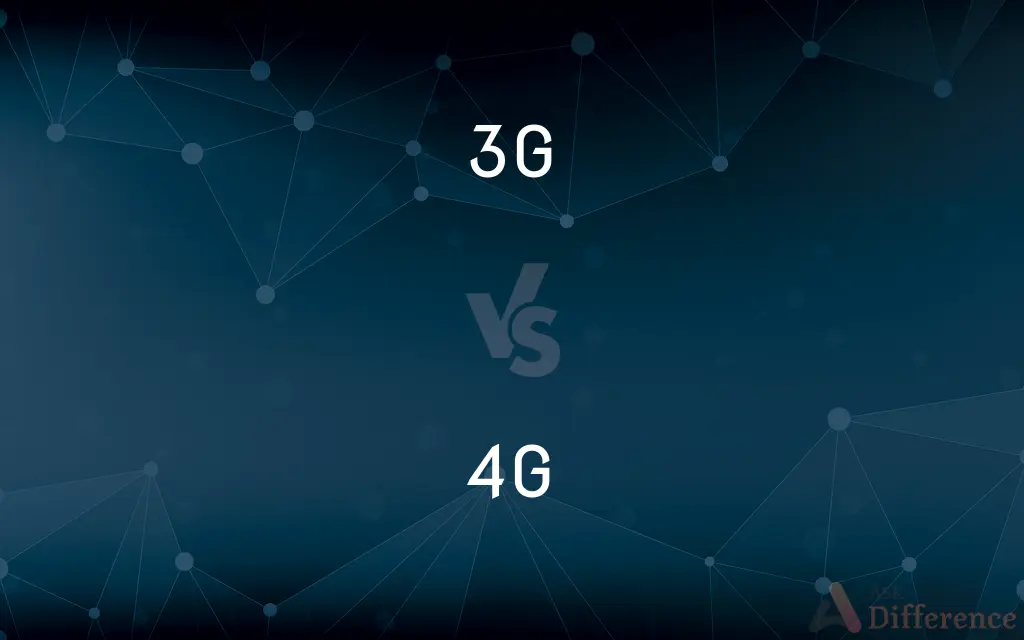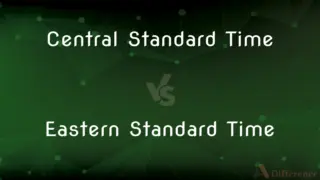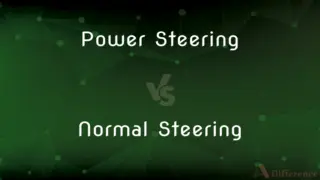3G vs. 4G — What's the Difference?
By Tayyaba Rehman — Published on December 7, 2023
3G stands for "Third Generation" mobile network technology, offering better speeds than 2G. 4G, or "Fourth Generation," is faster and more reliable than 3G, enabling high-definition mobile streaming and more.

Difference Between 3G and 4G
Table of Contents
ADVERTISEMENT
Key Differences
Historical Context: 3G emerged as an evolution from 2G technology, transforming the way users accessed the internet on their mobile devices. When 4G was introduced, it revolutionized mobile internet by providing even faster speeds and more stable connections.
Data Speeds & Performance: 3G provided a significant boost in data transmission rates compared to its predecessor. With 4G, users experienced an even greater surge in data speeds, allowing for real-time video streaming, smoother online gaming, and instantaneous file downloads.
Technologies Behind: The technology behind 3G includes Universal Mobile Telecommunications System (UMTS) and Code Division Multiple Access (CDMA) networks. 4G, on the other hand, primarily uses Long-Term Evolution (LTE) for its impressive speed enhancements.
Applications & Use Cases: With the rise of 3G, users began consuming more multimedia content on their phones, such as music and videos. 4G further amplified this consumption trend by making high-definition video streaming, video conferencing, and large file downloads more feasible.
Evolution to Newer Tech: While 3G was a significant step up from 2G, 4G set the stage for even more advanced network technologies, ultimately leading to the development and deployment of 5G, the fifth-generation technology.
ADVERTISEMENT
Comparison Chart
Generation
Third Generation
Fourth Generation
Typical Speeds
384 Kbps - 2 Mbps
20 Mbps - 100 Mbps
Core Technology
UMTS, CDMA
LTE
Primary Uses
Mobile browsing, music streaming
HD video streaming, real-time gaming, video conferencing
Evolution Outcome
Bridge to multimedia content
Foundation for next-gen networks (like 5G)
Compare with Definitions
3G
The third generation of mobile network technology.
3G allowed me to browse the internet on my phone more efficiently.
4G
The fourth generation of mobile network technology.
4G offers speeds that make streaming HD videos a breeze.
3G
A mobile communications standard with improved data speeds over 2G.
After upgrading from 2G to 3G, my music streaming became smoother.
4G
A technology offering faster and more reliable internet than 3G.
Once I switched to 4G, my online gaming sessions became lag-free.
3G
A technology that supports multimedia services and applications.
I started watching videos on my mobile device thanks to 3G.
4G
The bridge between 3G and the anticipated 5G technology.
4G set the stage for the next revolution in mobile networks: 5G.
3G
A transitionary phase in mobile technology before the onset of 4G.
3G laid the groundwork for the high-speed internet we experience with 4G.
4G
A network standard that supports high-definition streaming and large file downloads.
I conducted a video conference on the move, thanks to my 4G connection.
3G
A network evolution facilitating faster mobile internet access.
With 3G, my emails and attachments loaded quicker than before.
4G
Primarily known for its use of Long-Term Evolution (LTE) technology.
My phone displays LTE on the top, indicating it's using 4G technology.
Common Curiosities
Were there significant changes in device design from 3G to 4G?
While devices evolved, the primary changes were internal, focusing on better antennas and modems for 4G.
Is 4G LTE the same as 4G?
LTE stands for Long-Term Evolution and is a standard for 4G. Not all 4G is LTE, but most modern 4G networks use LTE.
Can a 3G phone work on a 4G network?
Typically, a 3G phone cannot leverage 4G speeds but can work on a 4G network with 3G speeds.
How does 4G differ from 3G in terms of speed?
4G offers significantly faster data speeds compared to 3G.
Why is 4G often associated with streaming?
4G provides speeds suitable for high-definition streaming without buffering.
Are there regions where 4G is unavailable but 3G is?
Yes, certain remote or underserved areas might have 3G coverage but not 4G.
Will 4G become obsolete with the rise of 5G?
While 5G is the future, 4G will still be relevant for many years as infrastructure and devices transition.
How widespread is 4G coverage globally?
As of the last update, 4G has seen broad adoption globally, but coverage varies by region.
What does 3G stand for?
3G stands for "Third Generation" of mobile network technology.
How has 3G impacted mobile internet usage?
3G made mobile browsing and multimedia consumption more accessible and efficient.
What came before 3G?
Before 3G, there was 2G, which was primarily used for voice calls and text messages.
Is there a noticeable difference in battery drain between 3G and 4G?
4G can consume more battery due to its faster speeds, especially during data-intensive tasks.
Can I force my phone to use only 3G to save data?
Yes, most smartphones allow you to select preferred network modes, including 3G-only.
Are 3G plans cheaper than 4G?
Often, 3G plans can be cheaper, but it varies by region and provider.
Why do some people still use 3G when 4G is available?
Reasons can include cost savings, device limitations, or adequate needs met by 3G speeds.
Share Your Discovery

Previous Comparison
Central Standard Time vs. Eastern Standard Time
Next Comparison
Power Steering vs. Normal SteeringAuthor Spotlight
Written by
Tayyaba RehmanTayyaba Rehman is a distinguished writer, currently serving as a primary contributor to askdifference.com. As a researcher in semantics and etymology, Tayyaba's passion for the complexity of languages and their distinctions has found a perfect home on the platform. Tayyaba delves into the intricacies of language, distinguishing between commonly confused words and phrases, thereby providing clarity for readers worldwide.












































